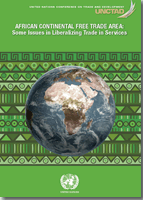
The 18th Ordinary African Union Summit held in January 2012 in Addis Ababa, Ethiopia, endorsed an Action Plan for Boosting Intra-African Trade and a roadmap for the establishment of a Continental Free Trade Area (CFTA), to be operationalized by an indicative date of 2017.
There is an aspiration and commitment to pursue services liberalization to booster trade in services as part of the CFTA goal of boosting overall intra-Africa trade.
The African Union has also agreed to conduct negotiations on trade in goods and in services in the first phase of the CFTA negotiations. So services liberalization and the development of services supply capacity and services trade are central to the formation of an integrated African market.
The services sector contribution to development is undeniable. The services sector is the world's largest employer, and produces 70 percent of global gross domestic product (GDP). Services however account for only one-fifth of global trade, leaving trade in services only about an eighth as intensive as trade in merchandise (Ghemawat, 2011). For this reason, trade in services is a relatively unexplored sector compared to trade in goods. However, it is easily illustrated that the channels through which merchandise trade benefits economies extend effectively to trade in services especially since services make up a far greater part of the world economy than goods.
Infrastructure services such as transport of goods by road, air, railway and ships, is the underpinning enabler for greater integration. The movement of people requires good transport infrastructure, but also spurs the development of connecting roads and railways simply through their movement or “lobbying with their feet”. Ghemawat suggests the liberalization of services could potentially push the resulting gains past five percent of global GDP.
This report is designed to inform and assist African trade policy makers, negotiators and regulators, as well as concerned stakeholders in the business sector, academia and civil society about the development potential of services sector and services trade development in Africa, and suggestions on how to negotiate a services trade agreement in the context of the CFTA so as to boost African services supply capacity and intra-African services trade growth.
Chapter I examines the broader role contribution of services and services trade, including through integration into global and regional value chains, in promoting economic growth and development.
Chapter II focuses on the contribution of services to development in Africa and efforts undertaken at intra-African level in terms of trade agreements to unlock the potential of services trade.
Chapter III discusses the various services negotiation modalities and approaches that African countries can consider in development a continental services agreement under the CFTA.
Finally the Conclusion highlights some suggestions on a CFTA Services Agreement.




